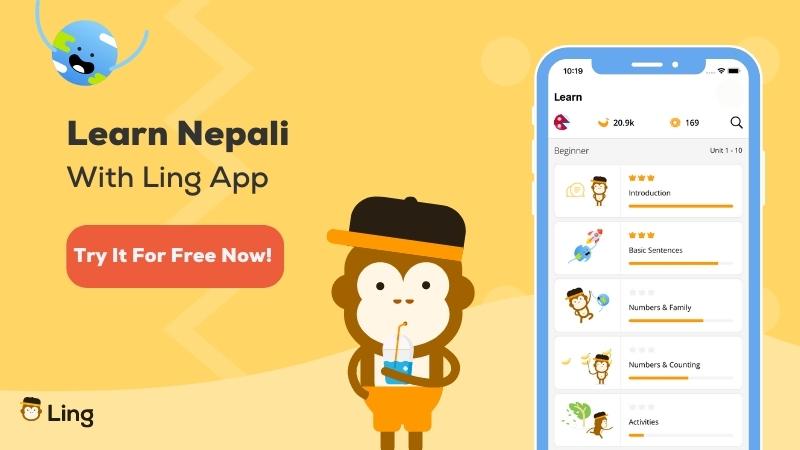Do you know an essential fact about Nepali culture? The people belonging to Nepalese culture highly value politeness and sanctity. So, if you want to make a good impression in front of the locals of Nepal, learn some polite Nepali phrases like मलाईं माफ गर्नुहोस् (Malā’īṁ māpha garnuhōs).
Do you see people smiling and bowing to each other whenever you look up Nepali culture on google? Well, that is because Nepali people are known for their kind and polite nature. They are calm in the heart and strong in mind, which allows them to treat their fellow beings righteously with politeness. So, before you land in the country of love and courtesy, today’s post will take you through basic words and phrases in the local language to help you carry a positive attitude in Nepal. Learning them will also improve your vocabulary and make you fluent in one of the most popular Indo-Aryan languages, Nepali.
Ready to learn more? Continue reading below and get acquainted with the beauty of the Nepali language.
The Buddhist Influence
Nepali people value politeness and respect. However, such manners and etiquette have reasons. The Buddhist influence mainly brought about the locals’ calm and peace-loving nature.
Buddhism follows the path of enlightenment which requires one to be morally mannered, gentle in speech, and peaceful in thought. Such teachings ask one to follow the law of politeness and gentle manners. Buddhism is highly favored in Nepal, and many Buddhist monks are given exalted positions in society.
There is also a Buddhist text known as “Vinaya,” which talks specifically about politeness in human nature. So, once you visit Nepal, you will feel the importance of such texts and the status provided to monks who have renounced worldly affairs in respect of Buddha. Every citizen has a unique character, and courtesy is found in every stage of their life. So, the moment you reach Nepal and start engaging with the locals, you must be aware of their lifestyle. Anything otherwise can offend someone unintentionally and bring lousy faith to your personality. If you are interested, let’s get started with the basics in the following section.
Polite Nepali Phrases

Now we will go through some basic polite phrases and words you must know and use while conversing with the Nepali locals. Although many locals speak English and will entertain you with your native vocabulary, learning the language and some manners to show respect for their culture is only kind. So, please give the following pronunciation list a good read and become aware.
1. Hey- नमस्ते
The first polite word that you must be aware of is Namaste. Nepali people always greet each other as a sign of respect and friendliness. So, you are likely to see locals welcoming you. In such situations, it is essential to greet them back and wish them well for positive interaction.
The most common way of greeting someone in Nepal is by taking your palms together in a praying position in front of your chest. You may then follow up with a subtle bow and say Namastē.
2. How Are You?- तिमीलाई कस्तो छ?
It is polite to show care for others. So, whenever you meet someone in Nepal, never forget to greet them and ask how they are doing- Timīlā’ī kastō cha? It shows how sincere and courteous you are from the heart, bringing in a warmer response in return. People who do not seem to care about others or show concern are often canceled in society. Especially in Nepal, people believe in community well-being and always look for ways to celebrate friendship. So, acting ignorant and indifferent will only make your trip more stressful and confusing. If you want to sound more friendly while conversing, you can also say tapailai kasto cha?
3. Did You Sleep Well?- के तिमी राम्ररी सुत्यौं?
If you want to start your day with a calm and kind phrase in a beautiful country, uttering Kē timī rāmrarī sutyauṁ? is a must. While you can also say good morning or good evening in a simple sense, to make things sound more engaging, you must try to use the first one. It is also one of the best ways of starting a meaningful conversation.
4. Please- कृपया
Another word that will help you in asking questions, enquiring about things, or even requesting people without offending anyone is Kr̥payā. When we say Nepali people are polite, it is innate in their speech. So, whenever you talk to someone, you will realize how they like to gently put their words and not sound like they are ordering or forcing them on you. Especially being a foreigner, you will be expected to be temperate with your words and thoughts. So, the best way to do it would be to use words like Kr̥payā.
5. Sorry/Excuse Me- माफ गर्नुहोस्
Just like the previous word, there is another that will help you come out of different situations politely without hurting anybody’s feelings, and that is Malā’īṁ māpha garnuhōs. Whether you stumble at someone, interrupt someone in the middle, or ask for a favour from a stranger, words like this will help you get through and reach your destination. Being in a strange city, you cannot just walk past people without feeling sorry or excusing yourself at times of need. So, learning a more respectful version of the speech is much needed.
6. Yes/No- हो/होइन
Knowing how to confirm something or deny an argument or offer is essential. Just standing there with a blank face or a rude expression will not help. So, whenever you confirm something, you can say Hō. In cases where you want to refuse or deny something, hō’ina is the right word for you. You must be aware of these basics to polity blend in with the locals. If you want to sound more courteous when you are confirming or agreeing with someone’s point, you can also use the word हजुर– hajur.
7. Thank You- धन्यवाद
We all know that Thank You is a universal phrase used when something is given or done in one’s favour. It is a mark of appreciation and a way of showing gratitude. However, if you want to impress the locals with a native term, Dhan’yavāda is the right word. Never forget to thank or show appreciation when locals help you or offer you a gift. Nepali people are always helpful and kind. So, once you receive such affection from them, it is only respectful to return a similar favor, at least by leaving a Thank You note.
8. It’s Okay/No Thanks- यो ठीक छ/होइन धन्यवाद
There will be instances where you will have to refuse an offer or return a speech when someone is sorry to you. In such cases, only yes/no will appear a little odd. So, the best way to refuse an offer politely would be to say hō’ina dhan’yavāda. And when it comes to replying to someone saying sorry to you, Yō ṭhīka cha is the proper term to use. These will also give a sophisticated impression of your skills and personality, making locals inclined toward you.
9. May I Help You?- के म तपाईलाई मद्दत गर्न सक्छु?
It is always kind to help people out without any selfish motive. It is even more courteous to help people out when the person has not even asked for it themselves. However, such steps might offend someone in cases when they might feel pitied So, to avoid misconceptions and offer a helping hand without hurting someone’s intention, it is best to ask Kē ma tapā’īlā’ī maddata garna sakchu? Whenever you see someone struggling, you can politely reach out to them by using this phrase.
10. Nice To Meet You- तपाईँलाई भेटेर खुशी लाग्यो
Once you have met someone and are about to part ways, it is always kind to say Tapā’īm̐lā’ī bhēṭēra khuśī lāgyō. It makes bonds more robust and makes the other person realize their presence. Especially when meeting someone for the first time, always use such phrases and leave better notes for the next meeting. It leaves no worry concerning the gathering and ends the day on good terms. So, make sure you use it whenever the situations ask for it.
More Nepali Phrases To Use

Wrapping Up!

Did you feel the excitement running through your blood as you went through this blog? Well, such an adrenaline rush will come in handy once you reach the country and start interacting with the natives. The locals will be shocked to see your efforts and appreciate your concern.
The Ling app has the best resources if you want to learn more such language lessons and impress the locals further. Ling is one of the best language learning apps that cover 60+ languages and content on various topics like food, sports, weather, greetings, and many more through blog posts. One of the best things about the app is that it has recorded audio lessons from native speakers that ensure you pick up the correct accent.
You also interact with an AI Chatbot, which improves your speech and communication and makes you a fluent speaker of the target language. So, what are you waiting for? Download Ling today from Appstore or Playstore and start learning Nepali from the core!



































































